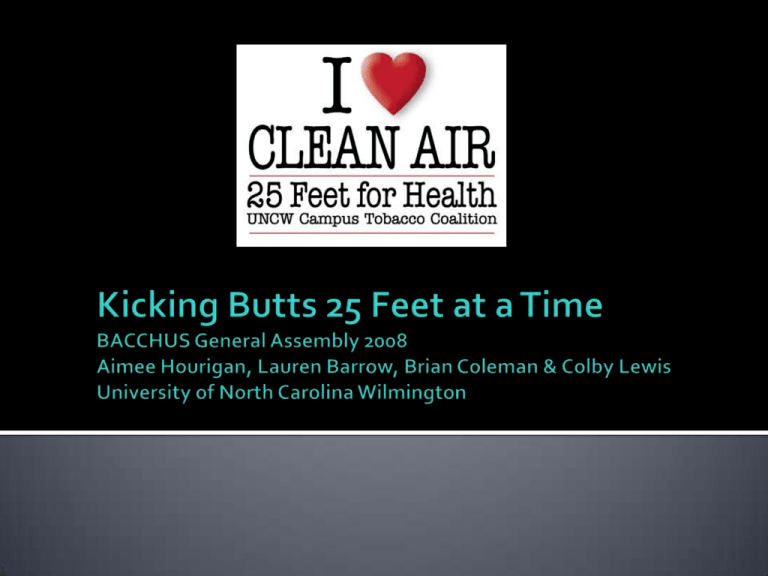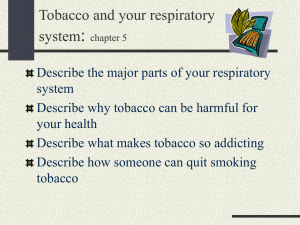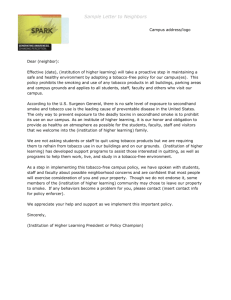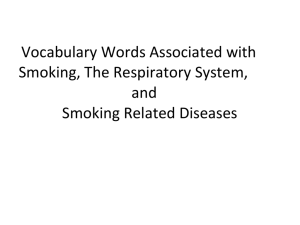Document 12019781
advertisement

A group of students, faculty, and staff dedicated to improving the health of UNCW through encouraging tobacco cessation (a.k.a quitting) and limiting exposure to secondhand smoke. Funded by a grant from the N.C. Health & Wellness Trust Fund (tobacco settlement money) PROFESSIONAL REPRESENTATION: CROSSROADS Health Promotion Faculty member, Health and Applied Human Sciences Student Health Services Substance Abuse Counselor, UNCW Counseling Center Campus Recreation University Police Maintenance and Grounds staff Environmental Health and Safety Faculty member, Nursing UNCW Athletics Campus Life/Union staff Community Project ASSIST New Hanover County Health Department Wilmington Health Access for Teens STUDENT REPRESENTATION: Student Health Association Student Government Association Graduate Student Association CROSSROADS graduate assistants & peer educators Seahawk student newspaper; Fraternity/Sorority members International Student Association Art and Theatre Students Community Development Assistants (Off-campus R.A.-type students) Non-traditional Student Organization Residence Hall Association PRIDE Research shows policy can: Diminish the perception that “everyone smokes” Reduce the visibility of smokers Protect non-smokers from exposure to environmental tobacco smoke Encourage smokers/tobacco users to quit The environment in which individuals live influences their behavior, therefore, policy initiatives change both campus culture and individual smoking behavior. 30% report smoking cigarettes. 19% smoke occasionally 8-12% smoke daily 30% of those students smoke 10 or more cigarettes per day. Higher than state and national average for full-time college students. 58.4% of current UNCW smokers reported that they want to quit. 68% of senior smokers want to quit versus 46% of freshmen smokers. Overall, 73.7% of UNCW students report that they do not have plans to smoke after graduation. CROSSROADS Quit Kits & Appointments Westside Hall 2nd Floor Student Recreation Center #104 962-4136 1-800-QUIT-NOW Website just to help UNCW quit: http://seahawks.stopsmokingcenter.net Less health complaints from students, staff, faculty, and visitors More physically attractive campus Cost savings from tobacco clean up Reduce fire hazard and environmental impact Less exposure to secondhand smoke for everyone Reduced tobacco use • Smoking is prohibited in all UNCW buildings. • Smoking is prohibited up to 25 feet outside the entrance to any campus building (measured as 25 feet from the end of each formal entrance structure). • Smoking is prohibited in all UNCW vehicles. • The sale of tobacco products on campus is prohibited. • The free distribution of tobacco products on campus is prohibited. • Registered student organizations are prohibited from accepting event sponsorship from tobacco brand companies and from promoting tobacco products. Mainstream smoke (what smokers inhale) Second-hand smoke They’re the same Has twice as much nicotine and tar as what smokers inhale Is a class A carcinogen Triggers asthma attacks, bronchitis, and other respiratory illnesses Causes lung cancer and cardiovascular disease Raises blood pressure and heart rate after just five minutes of exposure Resources: www.surgeongeneral.gov/library/secondhandsmoke www.cdc.gov/tobacco One study found that outdoor areas where smoking was allowed had particulate matter concentrations nearly eight to ten times that of a busy highway. Cigarette smoke does not immediately dissipate, but disperses and forms a cone shape. Paper Survey administered to PED 101 participants (n=480) Online Survey open to any faculty, staff, students, and administration (n=264) Announced on UNCW website Available for 30 days, Spring 2007 Total participants: N=744 PDA Survey, Fall 2007, 165 student participants 65% female 87% Caucasian 63% aged 17-20 44% freshmen Online version: 41% staff 70% “never smoked” or “former smoker” 19% “smoke only when I drink” or “smoke occasionally; less than one cigarette/day” 8% “smoke daily” 3% unknown For purposes of agreement questions, social smoker and daily smoker were combined (n=207) Non-smokers should not have to walk through smoke to enter any building: Strongly Agree or Agree: 85% of all respondents 92% of Non-Smokers 64% of Smokers I would support a policy that prohibited smoking within 25 feet of campus buildings. Strongly Agree or Agree: 86% of all respondents 91% of Non-Smokers 72% of Smokers North Carolina: ECU: 25 foot smoking ban, August 2007 UNC Chapel Hill: 100-foot smoking ban, January 2008 New Hanover Regional Medical Center: all campuses became smoke free on November 15, 2007 NC Public High Schools: 100% tobacco free Nationally: 43 college campuses are now smoke-free Compliance increases when Students, faculty, and staff have been allowed to voice their opinions The campus has educational materials The campus offers cessation services The policy is celebrated Campuses find success in a constant awareness campaign, rather than punitive action. Campaign for Compliance Positive social pressure. Signs and butt buckets around every building Mailings, posters, events, creative physical reminders: “Caring for others starts here.” “25 feet for health” Wear an "I Love Clean Air" button. Discuss the policy change with your classmates, coworkers, and friends. Join our Facebook group “25 feet for Health!” Thank people who are complying with the policy! Become a member of the Campus Tobacco Coalition. We will continue to meet to assess our progress and plan for the future. Listen. Accentuate the positive. Talk about the benefits of the policy. Develop a health-centered argument. This is not a personal rights debate. Educate others about the dangers of environmental tobacco smoke and campus support for the policy. Provide resources – for info on ETS, for cessation services, for the Campus Tobacco Coalition Environmental Tobacco Smoke www.cdc.gov/tobacco www.surgeongeneral.gov/library/secondhandsmoke Tobaccofreeu.org Environmental scan Worksheet to identify campus partners UNCW http://seahawks.stopsmokingcenter.net www.uncw.edu/tobacco


